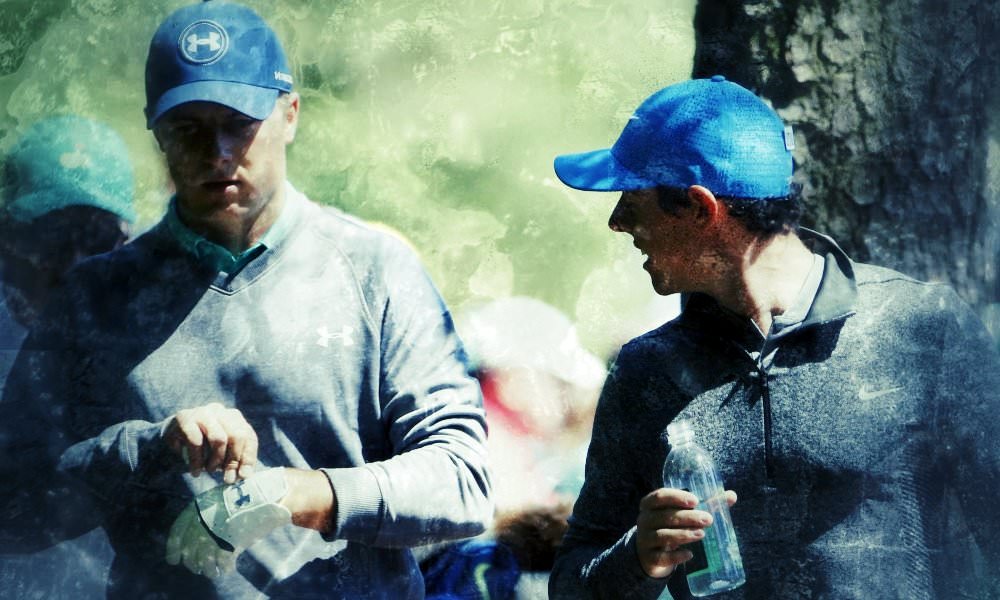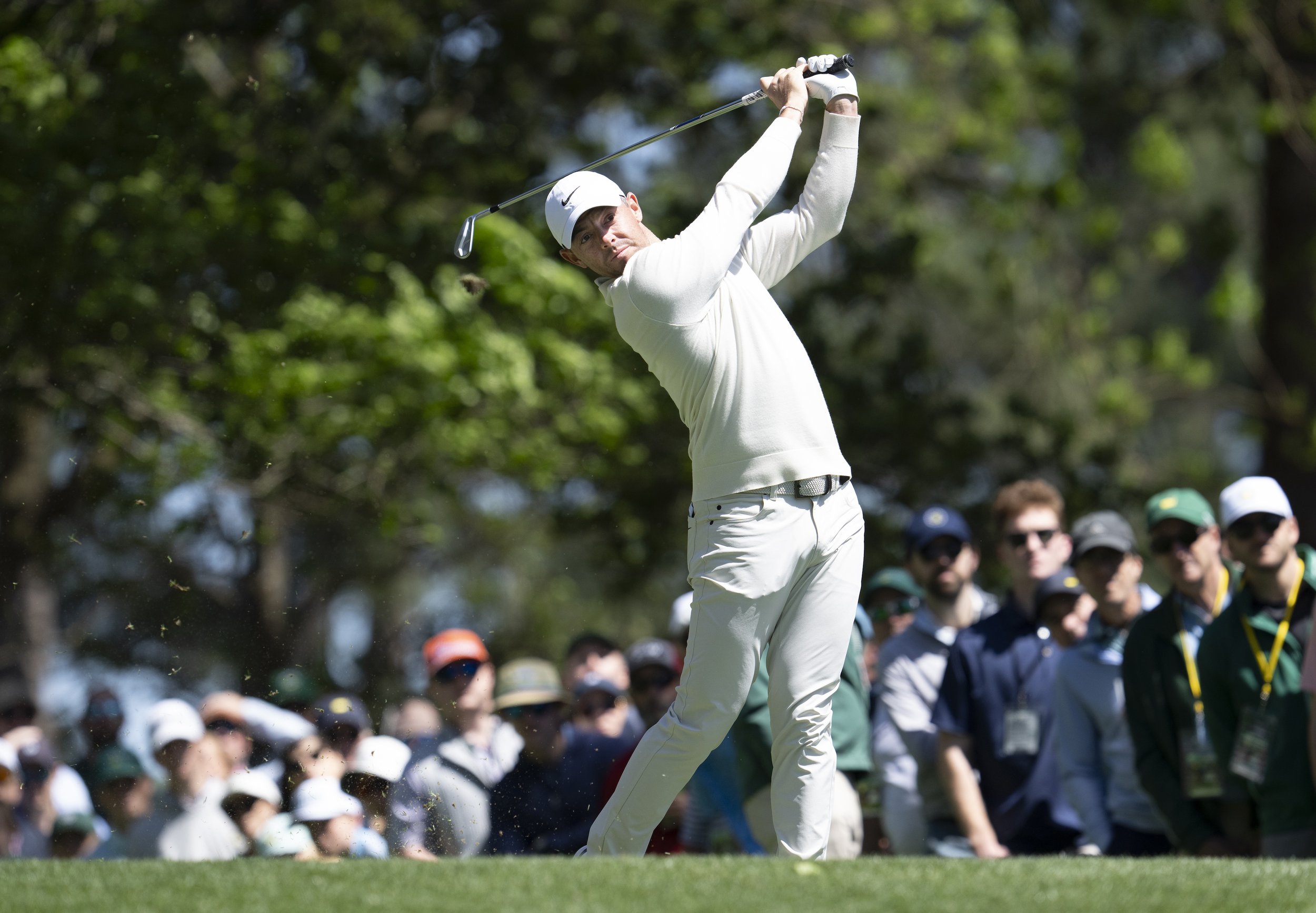McGinley on Rory's Masters destiny: "There's no such thing as a foregone conclusion in golf"

There’s no such thing as a sure thing in golf and while Paul McGinley believes that the stars will align and that Rory McIlroy will soon put together a performance for the ages, there is no guarantee that it will happen in the Masters.
Magnolia Lane became a boulevard of broken Masters dreams for the likes of Greg Norman, Tom Weiskopf, Davis Love III and Ernie Els.
"It seemed like one of the tournaments that I would win easily,'' Love told ESPN recently as he reflected on the green jackets that got away, especially 1995, when Ben Crenshaw won his second.
Norman’s pain is still palpable 20 years after Nick Faldo tore out his soul in the Cathedral of Pines, which McGinley describes as being like a big sound stage, tailor-made by Bobby Jones and Clifford Roberts for golfing drama.
As Padraig Harrington has pointed out, there’s not just everyone else’s bagged to deal with but your personal baggage—the voices inside your own head — the build up of disappointments.
“One of the things you're facing when you play The Masters is you face history,” said McGinley, who will be at Augusta National doing what he does well these days, analysing the event for Sky Sports.
“You're dealing with the mysteriousness, the history, all of the stories regarding The Masters. You're dealing with your own private history of being a little boy back in Ireland looking at The Masters in awe and hoping one day that you'll eventually get there, and you get there and all that history descends upon you while you're playing.
“When you get in contention obviously you're dealing with the expectations of trying to win a Major championship and trying to win one of the most prestigious Majors, which is obviously The Masters.
“So they're the kind of things that you have to deal with if you want to be a Major champion and you want to be the star that you hope to be, they're the challenges that you have to face down.”
The sounds of Augusta are almost more overpowering than the sights, especially on Sunday.
“The noise reverberates among the trees, bounces down off the hill and off the trees and kind of has this ripple effect,” McGinley says. “There are sell-out crowds obviously every day and even from the first shot being hit to the last shot being hit, the greens are surrounded and the crowds are huge. And that makes a tremendous atmosphere, and that's what makes The Masters so special.”
McIlroy heard those roars in 2011 when he opened with a 65 and led by four going into the final round only to see the pack eat up his lead quickly and take his dream away.
The youngster pressed and made mistakes, shooting an 80 that he swears was the round that helped him go on and win that year’s US Open and three more majors since.
Now 26, he’s surprised that the Masters is the major he needs to make up the set and complete the Grand Slam. But he’s also pleased as it’s the one that’s best suited to his game.
Nobody doubts he has the game to win not one but multiple green jackets but as Els and Love point out, it’s going to require patience.
"The attention isn't going to go away,” Els told ESPN’s Bob Harig. “He should just kind of roll with it. He should go with it, know it's going to come, find a way to deal with it. What Jordan [Spieth did winning in 2015] is incredible. He got it done early, early out of the way.''
McIlroy has several demons to deal with at Augusta National apart from the memories of 2011 and that drive the ricocheted left into the cabins at the 11th.
He’s never birdied the first in 26 attempts and his average score is over par at holes such as the 4th (3.03), 5th (4.11), 6th (3.07), 7th (4.23),10th (4.42),11th (4.23), 12th (3.15), 14th (4.03) and 16th (3.07).
On the plus side, he’s under par on the other eight holes — the par-five 2nd (4.65), the short par four 3rd (3.84), the par-five 8th (4.80), the tricky 9th (3.80), the par five 13th (4.61) and 15th (4.57), and most importantly in a tight finish, the 17th (3.86) and 18th (3.71).
“There’s no such thing as a foregone conclusion in golf and we all know how difficult the game is, and a lot of things that we expected to happen in golf didn’t happen.”
In other words, you never quite know what you will get from McIlroy at Augusta — he’s shot everything from 65 to 80 — but McGinley is convinced that not only is he a better putter than we give him credit for, he is also a lot more patient and mature than in years past.
And that’s key to dealing with a course that gives you easy birdies and eagles and takes away with tough par threes and ferocious par-fours, depending on the set up.
“In the words of the old song, 'You've got to know when to hold them, you've got to know when to fold them' and what they're talking about there in terms of Amen Corner,” McGinley says of a stretch of holes that hasn’t been particularly kind to McIlroy.
“You look at 10, you look at 11, you look at 12 and they're three difficult holes and that's when you've got to hold them.
“If you can get through those three holes with three pars you're then facing 13, a comfortably on in two par 5 for everybody in the field where a lot of eagles will be made, you've got the 14th with the green design, you can feed the ball back off the back slopes and maybe make another birdie there too.
“Then again you've got an eagle chance on 15 and maybe an eagle chance on 16, if the pin is on the left hand side, and obviously 15 being a par 5. So that's a chance on those four holes. If you can hold them on 10, 11 and 12 with three pars, you've got a great chance on 13, 14, 15, 16 to really gain some momentum.”
McGinley knows McIlroy well and understands that the Ulsterman reacts best when he’s being doubted or his back is against the wall.
While he has yet to hit top form in all four rounds this year, the former Ryder Cup skipper believes it’s only a matter of time.
He also sees McIlroy as a player who is emotionally better prepared than the 21-year old of 2011 to listen to his caddie J.P. Fitzgerald and play Augusta National the way it should be played.
“I think he's very much more mature as a golfer than he was back then, he's a lot more experienced obviously with those Major wins and big titles around the world,” McGinley says. “He's in a much better place mentally and physically than he would have been back there.
“If he's going to win this Masters, which of course he's well capable of and he's started to trend towards in terms of his form, he knows he's got to be on it for four days and play the golf he's well capable of, and putt to the standard we saw in Doral.
“There's no such thing as a foregone conclusion in golf and we all know how difficult the game is, and a lot of things that we expected to happen in golf didn't happen.
“Everybody's got strength and weaknesses and he's blessed with some incredible talent in terms of hitting the golf ball, hitting it prodigious distances.
“He's blessed with the ability to very much front foot golf in terms of lots of birdies, lots of aggression, bringing a golf course to its knees. He's got that ability to go into another gear that not a lot of guys have.
“I personally don’t buy into the idea that putting is a weakness for Rory”
“There's other things that he's maybe not as blessed with and maybe putting is one of those. But you could say the same about every other player. Jordan Spieth is blessed in some ways with the putter but not blessed with the talent that Rory would have off the tee or the explosiveness that Rory is able to show in terms of bringing a golf course to its knees.
“So I would expect that at one stage it's all going to collide and we're going to see a big Rory success.
“Going back to your first question about where he is now and where he was a couple of years ago, it’s that maturity that he has. I think he’s got a great guy on his shoulder in terms of J.P.”
There has been much talk of McIlroy’s putting this year since he changed to the left below right grip for Doral. But McGinley is not overly concerned with a player he’s always seen as a good but streaky putter.
“I personally don’t believe or buy into the idea that putting is a weakness for Rory,” he says. “I think it is accentuated with Rory because he hits more greens and has more opportunities for birdies than most and it looks like he is missing more putts than he actually is. His percentages are pretty good and that brings its own challenges.”
Left-handers like Bubba Watson, who hit a controlled fade, can do well. But so do righties who can hit the draw and McIlroy fits the bill.
Whether he can do it this year is in the lap of the golfing gods but there’s no doubt he has the ability.








